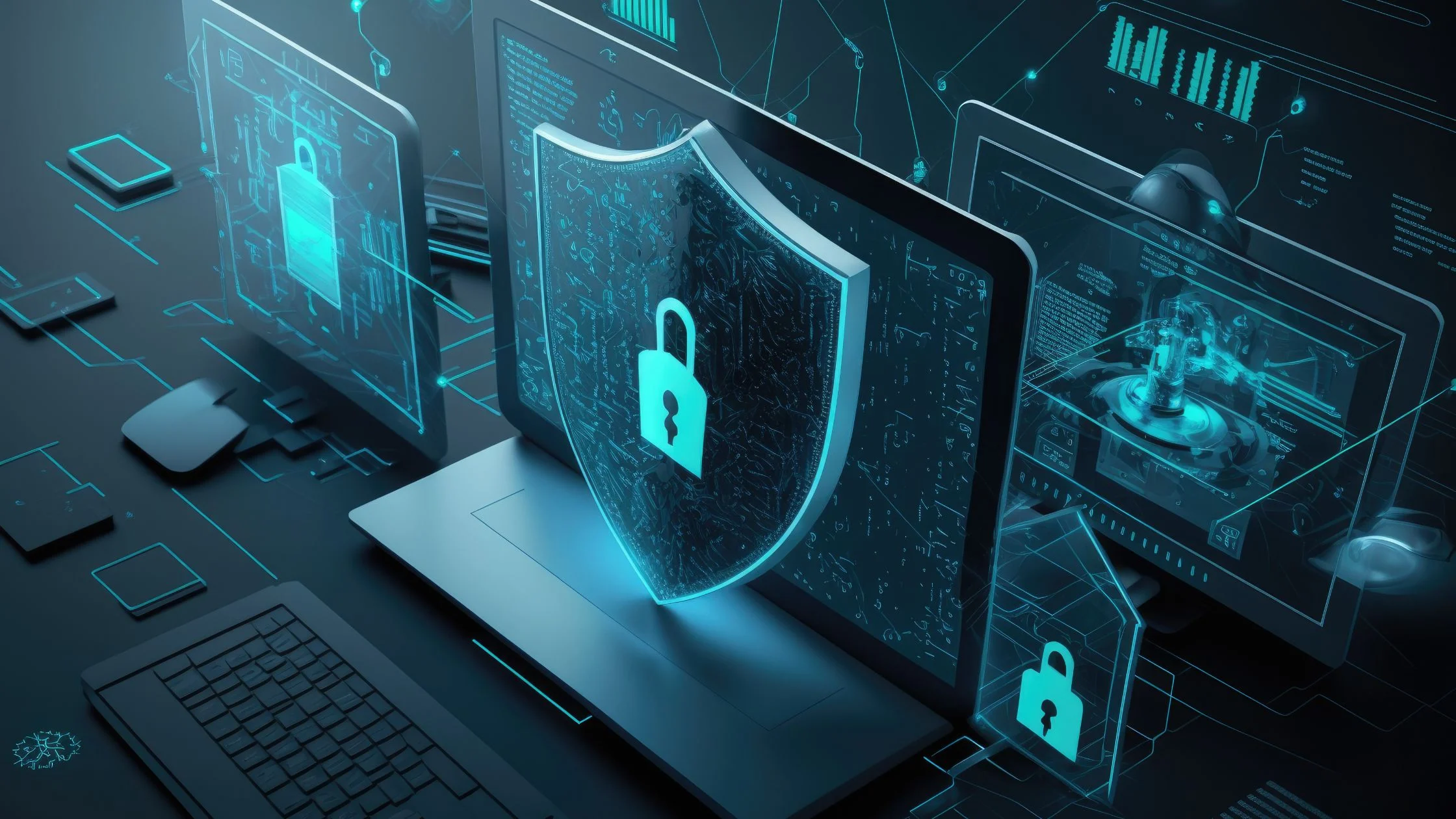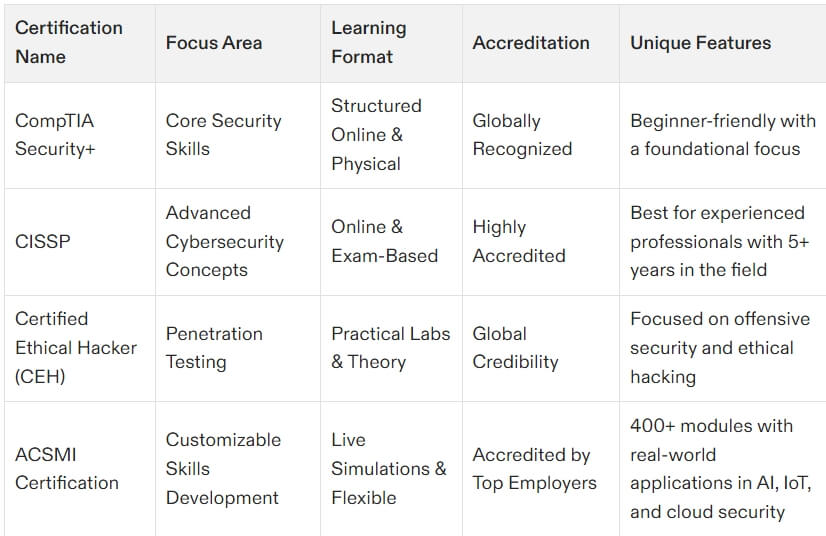Table of Contents
- Introduction
- Why Consider Cybersecurity Certification Programs?
- Types of Cybersecurity Certification Programs
- Benefits of Cybersecurity Certification Programs
- Popular Cybersecurity Certification Programs
- The Role of ACSMI in Cybersecurity Education
- Informative Table Comparing Certifications
- FAQs About Cybersecurity Certification Programs
- Final Thoughts
Introduction
The digital age has opened doors to countless opportunities, but with innovation comes an alarming rise in cyber threats. From ransomware attacks holding industries hostage to data breaches exposing sensitive information, cybersecurity has become the crux of digital operations. Organizations are desperately seeking skilled professionals to safeguard their ecosystems, leaving an opportunity-rich field for those willing to upskill. This is where Cybersecurity Certification Programs come in. Designed to validate knowledge and skills, these programs are essential for anyone pursuing a fulfilling career in cybersecurity. From foundational courses to specialized modules like the ACSMI Certification, certification programs serve as your ticket to success in this rapidly evolving industry. This guide will help you understand the benefits, opportunities, and long-term value of enrolling in Cybersecurity Certification Programs.
Why Consider Cybersecurity Certification Programs?
The global cost of cybercrime is expected to exceed $10 trillion annually by 2025, making cybersecurity one of the most in-demand fields today. Certification programs aren’t just optional anymore—they’re foundational to career growth. Here’s why they are indispensable.
1. Industry-Recognized Credentials
Earning a certification demonstrates your competence in cybersecurity principles. Many organizations, including Fortune 500 companies, mandate certifications like CISSP, CompTIA Security+, or specialized options like ACSMI Certification.
2. Career Advancement Opportunities
Certified professionals have an edge over their non-certified peers. Credentials not only increase employability but also pave the way for promotions, advanced roles, and higher salaries.
3. Practical Skill Development
Certification programs prioritize hands-on learning. From live simulations to real-world case studies, these courses equip you with actionable skills to tackle even the most complex security challenges.
4. Staying Relevant in a Fast-Evolving Field
Cyber threats evolve constantly. Certification programs keep professionals up-to-date on the latest technologies and best practices, ensuring they remain valuable members of their organizations.
5. Customizable Learning Paths
Modern certification programs like ACSMI offer a modular structure, allowing you to specialize in areas like AI-based security, IoT, or penetration testing. This tailored learning experience boosts your expertise and confidence.
Types of Cybersecurity Certification Programs
The world of cybersecurity certifications is vast, catering to varied levels of expertise and roles. Below is an overview of the most popular types.
1. Entry-Level Certifications
These are designed for newcomers seeking foundational knowledge. Examples include CompTIA Security+ and Microsoft Certified Cybersecurity Fundamentals. Perfect for kickstarting your career.
2. Intermediate Certifications
These cater to professionals ready to scale up their expertise. Certifications like Certified Information Systems Auditor (CISA) or Certified Ethical Hacker (CEH) fall under this category.
3. Advanced Certifications
For seasoned experts, advanced certifications such as Certified Information Systems Security Professional (CISSP) or the ACSMI Advanced Modules focus on niche areas like identity management or zero-trust strategies.
4. Specialized Certifications
Certain certifications cater to specific fields, such as cloud security or IT governance. Examples include AWS Certified Security Specialist and ACSMI’s 400 modules that cover emerging technologies.
Benefits of Cybersecurity Certification Programs
Enrolling in Cybersecurity Certification Programs opens doors to exciting career possibilities. Here’s a closer look at what makes certifications an invaluable asset for IT professionals.
-
Higher Salaries
Certified professionals earn up to 30% more than their non-certified counterparts. -
Greater Job Security
With digital ecosystems expanding rapidly, the demand for certified cybersecurity experts is guaranteed to grow. -
Global Career Opportunities
Certifications recognized internationally, like the ACSMI program, improve employability in global markets. -
Leadership Potential
Certifications don’t just validate skills—they equip you with strategic insights needed to lead cybersecurity teams effectively. -
Hands-On Expertise
Practical labs and simulations prepare you for tackling issues like malware attacks, ransomware mitigation, or endpoint security in real-world scenarios.
Popular Cybersecurity Certification Programs
Here’s a list of some highly recommended programs in the field.
- CompTIA Security+ – Great starting point that covers everything from network security to compliance.
- CISSP – Gold standard for professionals with significant work experience. Covers advanced topics, including risk management and infrastructure security.
- Certified Ethical Hacker (CEH) – Prepares candidates to identify, report, and fix vulnerabilities in systems.
- ACSMI Certification – Over 400 modular options make it a versatile choice for professionals at all levels.
- AWS Certified Security – A specialized program for securing cloud-based platforms.
The Role of ACSMI in Cybersecurity Education
If you’re looking for a program that checks every box, ACSMI Certification is a game-changer. Here’s why this modular certification stands apart:
1. Customizable Learning Paths
With 400+ modules, ACSMI lets learners specialize, offering flexibility to match their career aspirations.
2. Real-World Applications
ACSMI emphasizes actionable insights through live simulations and problem-solving tasks.
3. Industry Recognition
Globally accredited, ACSMI certifications signal expertise, making you an attractive candidate for top-tier employers.
4. Coverage of Emerging Topics
ACSMI includes modules on cutting-edge fields like AI-driven security measures, IoT, and zero-trust frameworks, keeping you ahead of the cybersecurity curve.
Informative Table Comparing Certifications
FAQs About Cybersecurity Certification Programs
1. Are cybersecurity certification programs worth the investment?
Absolutely. Certifications boost your employability, salary, and skills, making them highly valuable in today’s job market.
2. Which certification is best for a beginner?
CompTIA Security+ or the foundational modules of ACSMI are excellent for newcomers.
3. How often do certifications require renewal?
Most certifications, including ACSMI, require periodic renewal (one to three years) via refresher courses or exams.
4. Can I pursue certifications while working full-time?
Yes, most certifications are designed flexibly, offering online or self-paced formats suitable for working professionals.
5. How does ACSMI compare to other certifications?
ACSMI’s modular structure makes it one of the most flexible and comprehensive programs, covering both foundational and advanced topics to meet industry needs.
Final Thoughts
The demand for cybersecurity expertise shows no signs of slowing down. Enrolling in a Cybersecurity Certification Program positions you as a competitive candidate in one of the most exciting and lucrative global industries.
Programs like ACSMI Certification take a modern approach to learning, offering flexibility, hands-on experiences, and global credentials to future-proof your career. Whether you’re a beginner aiming to enter the field or an experienced professional seeking to specialize, certifications build pathways to success.
Don’t wait for opportunities to find you—start your certification journey today and become a vital part of the cybersecurity world!


Leave a Reply